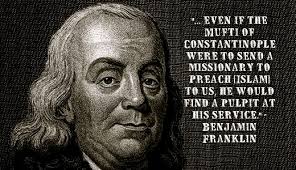
Most Americans know the names of our founding fathers, and that they believed in Peace, Liberty, Justice, and Freedom for all. However, most Americans do not realize that the founding fathers considered Islam among other religions when they were establishing our country. With the British no longer protecting their shores, one of the first tasks of the newly independent colonies was to create a defense from the Barbary pirates. This led to several diplomatic as well as several not so diplomatic relations with Morocco, Algeria, and Tunisia, the areas where most of the Barbary pirates were given refuge. As a result of these conflicts, Morocco became the first nation to recognize the US independence from England, but also became the first foreign country to have ever flown the American flag.
These interactions with Muslims were a source of great debate among the founding fathers. In their debates, they would conclude that Muslims needed to have their rights protected, even if they (founding fathers) saw the views of Muslims as being extreme. The best compilation of quotes and research in this area was conducted by Denise Spellburg, author of Thomas Jeffersons Qur’an: Islam and the Founders.
In 1784, Richard Henry Lee, one of the signers of the Declaration of Independence, wrote in a letter regarding the of the formation of the constitution, “The declaration of Rights, it seems to me, rather contends against forcing modes of faith and forms of worship, than against compelling contribution for the support of religion in general. I fully agree with the presbyterians, that true freedom embraces the Mahomitan and the Gentoo as well as the Christian religion.”

Thomas Jefferson, the primary author of the Declaration of Independence, Vice President of John Adams, and third President of the United States, owned a copy of the Quran. Today this copy of the Quran is stored at the National Archives. It was used to swear in the first Muslim congressman, Keith Ellison. Jefferson bought the Quran while attending William and Mary College in Virginia. He was so interested in the Middle East that he created a department at William and Mary College to teach “oriental languages.” (At that time, oriental referred to the Middle East.) In 1786, Jefferson helped to write the Virginia Statue for Religious freedom. During the writing of this statue, Islam and other religions were included in the discussions that led to the formation of the statue. Jefferson was so proud of his contribution to this statue, that he asked for this to be listed as one of his three greatest accomplishments on his tomb.
In In 1805, Jefferson hosted an Iftar in his home in Monticello, changing mealtime from 3:30 to sunset to accommodate his guests, a Tunisian envoy led by the Moroccan Sultan Sidi Soliman Mellimelli. The topic at the dinner was the protection of American coasts and ships from the attacks of the Barbary pirates.

John Adams, the second President of the United States said, “The United States is not a Christian nation any more than it is a Jewish or a Mohammedan nation.” He named the Prophet Muhammad one of the world’s great truth seekers alongside Socrates and Confucius. He said that Prophet Muhammad was a “Sober inquirer of the truth.” He helped to write the Massachusetts constitution, which indicated “the most ample liberty of conscience for Deists and Mohometans.” He did not change his view even when the United States was fighting the second Barbary War.

Benjamin Franklin dreamed of creating a place of worship where people of all religions could freely teach the principles of their religion. He said, “Even if the mufti of Constantinople were to send a missionary to preach Muhammadism to us, I would find a pulpit at his service.” Benjamin Franklin’s stand on the topic developed as a reaction to the Petition of Sect of Erika. The Erika were a sect of purists who prayed for the abolition of Muslims, mostly because of their hatred for the piracy and slavery practices of the Barbary pirates. He wrote a letter to the Federal Gazette in opposition of the petition, stating that it was, “problematic.” In the letter, he quoted the Muslim prayer, using the phrase, “Bismillah” (In the Name of Allah). In an article for the Huffington Post Religion, Frankie Martin wrote that when Franklin was told of how Native American slaves were treated, he said that they would be safer being prisoners in a Muslim country. Martin also says that he went on to praise Muhammad and Saladin for their justness and compassion.
Looking at the various statements and reactions of our founding fathers, it becomes apparent that the founding fathers found policies that took the liberties of people from a specific religion, including Islam, at the very least, to be problematic. They respected Islamic principles even though they did not agree with all of their practices. When they went to war with Muslims, they did not change their opinion about them. They negotiated with them, and made and effort to learn about Islam. This is an important lesson for our children to learn about our founding fathers.
- Who is Denise Spellburg? Research her works, her background, and her accomplishments.
- Who were the Barbary pirates? Why did they become a problem when America gained independence from England?
- What was the Virginia Statue for Religious Freedom?
- What two events led Benjamin Franklin defend Muslims in his writings?
- Why did Thomas Jefferson host an iftar?
- Which country was the first to recognize America’s independence from England.

